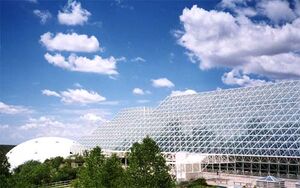Engineering:Closed ecological system

Closed ecological systems (CES) are ecosystems that do not rely on matter exchange with any part outside the system.
The term is most often used to describe small, personmade ecosystems. Such systems are scientifically interesting and can potentially serve as a life-support system during space flights, in space stations or space habitats.[1]
In a closed ecological system, any waste products produced by one species must be used by at least one other species. If the purpose is to maintain a life form, such as a mouse or a human, waste products such as carbon dioxide, feces and urine must eventually be converted into oxygen, food, and water.
A closed ecological system must contain at least one autotrophic organism. While both chemotrophic and phototrophic organisms are plausible, almost all closed ecological systems to date are based on an autotroph such as green algae.
Examples
A closed ecological system for an entire planet is called an ecosphere.[2][3]
Man-made closed ecological systems which were created to sustain human life include Biosphere 2, MELiSSA, and the BIOS-1, BIOS-2, and BIOS-3 projects.[4]
Bottle gardens and aquarium ecospheres are partially or fully enclosed glass containers that are self-sustaining closed ecosystems that can be made or purchased. They can include tiny shrimp, algae, gravel, decorative shells, and Gorgonia.[5]
In fiction
Closed ecological systems are commonly featured in fiction and particularly in science fiction. These include domed cities, space stations and habitats on foreign planets or asteroids, cylindrical habitats (e.g. O'Neill cylinders), Dyson Spheres and so on.[6]
See also
- Biology:Biosphere – Global sum of all ecosystems on Earth
- Engineering:Controlled ecological life-support system
- Chemistry:IBTS Greenhouse – Egyptian desalination project
- Earth:Ecology – Study of organisms and their environment
- Ecosphere – Planetary closed ecological system
- Biology:Ecosystem services
- Engineering:Eden Project – Visitor attraction in Cornwall, United Kingdom
- Engineering:MELiSSA – European Space Agency led consortium developing life support systems for space missions
- Engineering:Space colonization – Concept of permanent human habitation outside of Earth
- Astronomy:Spome – Hypothetical matter-closed, energy-open life support system
- Earth:Terraforming
- Astronomy:Chang'e 4 – Chinese lunar lander & rover
References
- ↑ I. I. Gitelson; G. M. Lisovsky; R. D. MacElroy (2003). Manmade Closed Ecological Systems. Taylor & Francis. ISBN 0-415-29998-5.
- ↑ "A Lexicon of the Spheres". Oregon State University. http://www.cof.orst.edu/cof/fs/turner/pdfs/lexicon_of_the_spheres.pdf.
- ↑ "ESO 2 Science 11: The Ecosphere and the Ecosystems". Science Helpdesk. http://www.sciencehelpdesk.com/unit/science2/11.
- ↑ Salisbury FB; Gitelson JI; Lisovsky GM (Oct 1997). "Bios-3: Siberian experiments in bioregenerative life support". BioScience 47 (9): 575–85. doi:10.2307/1313164. PMID 11540303.
- ↑ "What is an EcoSphere? (Shrimp and Gorgonia coral)". http://www.ecospheres.co.uk/what-is-an-ecosphere/.
- ↑ Westfahl, Gary (2005). "Space Habitats". The Greenwood Encyclopedia of Science Fiction and Fantasy: Themes, Works, and Wonders. Greenwood Publishing Group. pp. 736–737. ISBN 978-0-313-32952-4.
